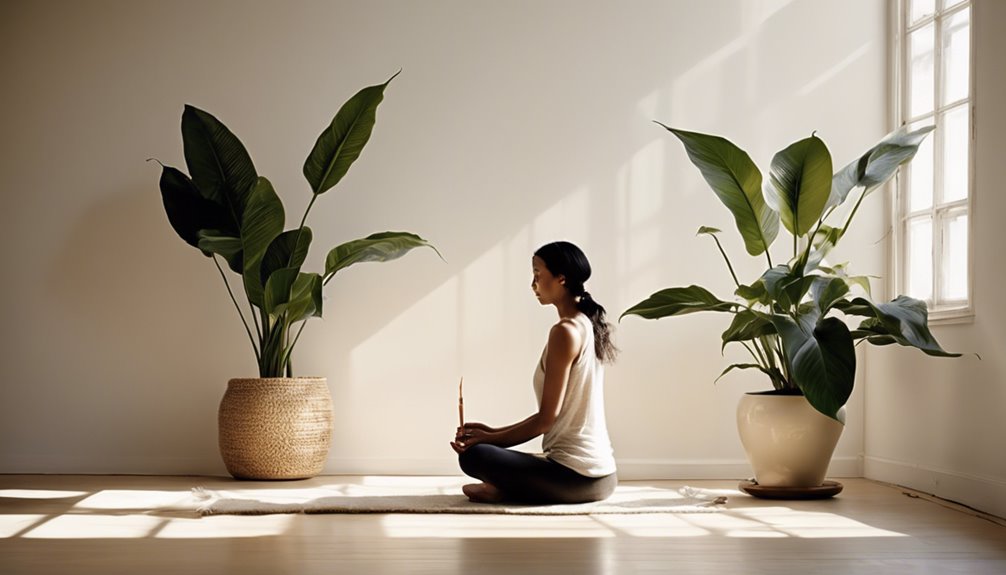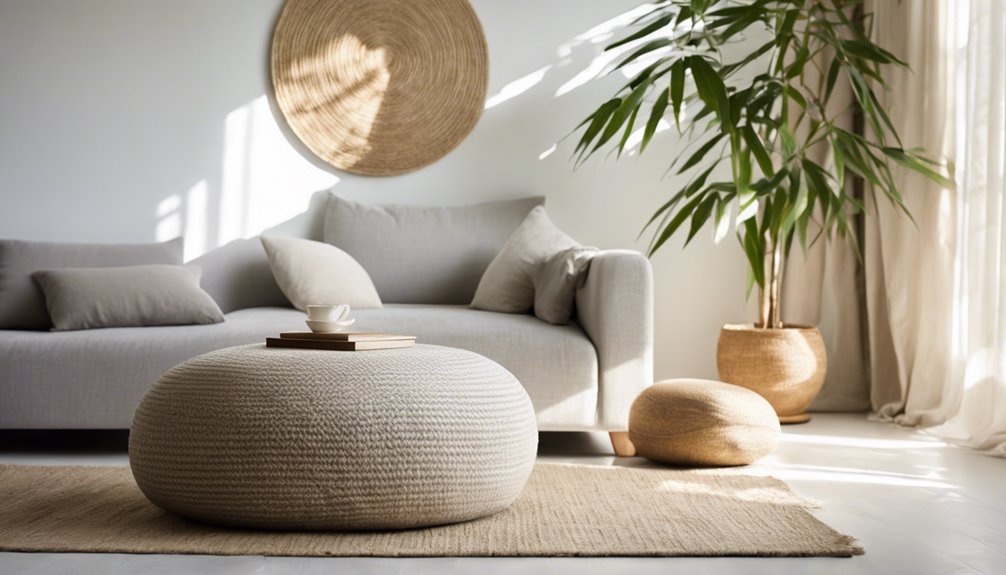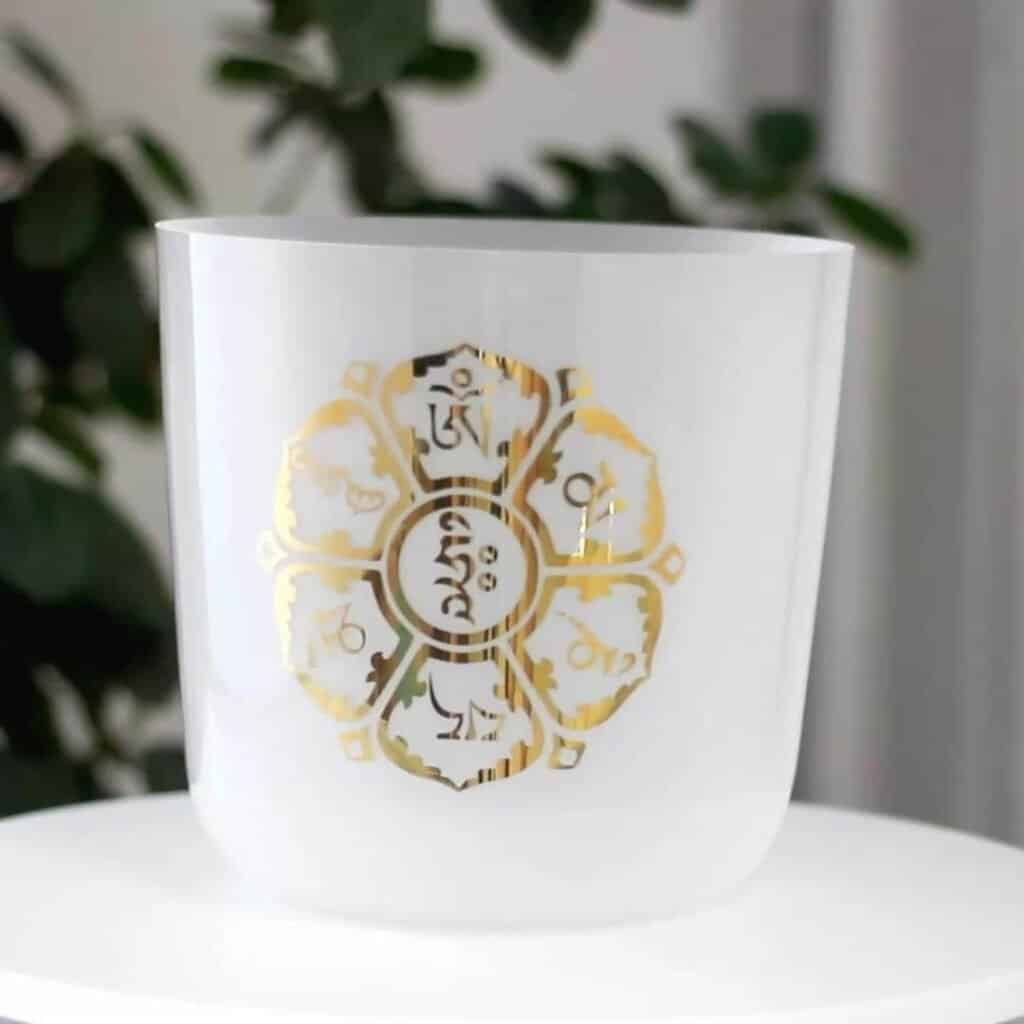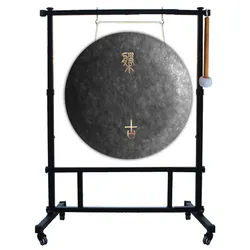If you've ever felt overwhelmed by life's constant demands, you're not alone in seeking a way to find peace amid the chaos. Mindfulness meditation offers a practical path to mental clarity and emotional balance, yet many people hesitate to start because they think it's too complex or time-consuming. The truth is, you don't need special equipment, advanced training, or hours of free time to begin experiencing the benefits of mindfulness. By understanding a few fundamental principles and simple techniques, you'll discover how accessible this transformative practice can be.
Key Takeaways
�?Start with 5-minute daily sessions focusing on natural breath observation while sitting comfortably in a quiet space.
�?Practice gentle awareness by counting breaths from 1 to 10, returning to 1 whenever the mind wanders.
�?Create a consistent routine by choosing the same time and place each day for meditation practice.
�?Use body scan technique by systematically observing physical sensations from head to toe without judgment.
�?When thoughts arise, acknowledge them like passing clouds and gently redirect attention back to breathing.
Understanding Mindfulness Basics

Learning about mindfulness begins with grasping its fundamental concept: paying attention to the present moment without judgment. When you practice mindfulness principles, you'll discover that your mind naturally wanders, but you can gently guide it back to the present experience, whether that's your breath, physical sensations, or surrounding sounds.
Understanding mindfulness involves recognizing that it's not about clearing your mind completely, but rather about developing a different relationship with your thoughts. Through awareness cultivation, you'll learn to observe your thoughts and feelings as they arise without getting caught up in them. You'll notice that thoughts come and go like clouds in the sky, and you don't need to chase or resist them.
As you begin your mindfulness journey, remember that it's a skill that develops through consistent practice, much like building a muscle. You're training your brain to stay present, notice when it drifts, and return to the moment with kindness toward yourself. This foundation of understanding will support your entire meditation practice, making each session more meaningful and effective.
Getting Started With Breath Work
Breath work serves as the cornerstone of mindfulness meditation practice, building on the basic awareness you've developed. When you focus on your breathing, you'll create an anchor that helps steady your mind and connect you to the present moment, allowing thoughts to drift by without engaging them.
To begin breath awareness, sit comfortably and direct your attention to the natural flow of your breath, noticing how it moves through your body. You'll feel the rise and fall of your chest or abdomen, the sensation of air passing through your nostrils, and the subtle pause between inhaling and exhaling. Don't try to control your breathing; simply observe its natural rhythm.
If you find your mind wandering, try breath counting as a helpful technique. Count each breath cycle from one to ten, then start over. When you notice you've lost count or your thoughts have drifted, gently return to one and begin again. This practice strengthens your concentration while teaching you to recognize when your mind has wandered, helping you develop the essential skills needed for deeper meditation practice.
Simple Daily Meditation Techniques

Building a consistent meditation practice starts with mastering a few straightforward techniques you can easily incorporate into your daily routine. You'll find that establishing morning routines creates a natural foundation for mindfulness, allowing you to approach each day with greater clarity and purpose. When you're first starting out, guided sessions can provide the structure and support you need to develop proper meditation habits.
- Begin with a simple body scan meditation, where you'll systematically focus your attention from your toes to your head, acknowledging any sensations without judgment
- Practice loving-kindness meditation by directing positive thoughts toward yourself and others, gradually expanding your circle of compassion
- Try walking meditation, which combines mindful movement with breath awareness, perfect for those who find sitting still challenging
As you explore these techniques, you'll discover which methods resonate most strongly with your personal style. Don't feel pressured to master everything at once – instead, choose one approach and practice it consistently until it becomes second nature. Remember that meditation isn't about achieving perfection but rather about developing awareness and presence in your daily life.
Common Challenges and Solutions
Mastering meditation inevitably comes with its share of obstacles, but every challenge has a practical solution. You'll find that self acceptance plays a significant role in overcoming these hurdles, as it's natural to face difficulties when developing a new practice. Effective distraction management becomes your greatest ally as you navigate through common meditation challenges.
| Challenge | Solution |
|---|---|
| Racing thoughts | Focus on breath counting, starting over when distracted |
| Physical discomfort | Adjust posture gradually, use cushions for support |
| Time management | Start with 5-minute sessions, slowly increase duration |
| Environmental noise | Incorporate sounds into practice, use white noise |
| Loss of focus | Practice gentle redirection without self-judgment |
When you encounter these obstacles, remember that they're normal parts of the learning process. Instead of getting frustrated, treat each challenge as an opportunity to deepen your practice. You'll discover that consistent effort, combined with a patient and accepting mindset, will help you develop stronger meditation skills over time. The key lies in maintaining a balanced approach between dedicated practice and gentle self-compassion.
Building Your Meditation Practice

Having identified common meditation challenges, you're ready to establish a sustainable practice that fits your lifestyle. Building meditation consistency requires a thoughtful approach that aligns with your personal motivation and daily routines, making it easier to maintain your practice over time.
- Start by selecting a specific time each day when you're least likely to face interruptions, whether it's early morning before the household wakes up or during your lunch break when you can find a quiet space.
- Create a dedicated meditation space in your home that you'll use consistently, keeping it simple but inviting with perhaps a cushion, timer, and any meaningful objects that help you focus.
- Track your progress using a meditation app or journal, which will help you stay accountable and notice patterns in your practice while building momentum through visible achievements.
Remember that your meditation journey is uniquely yours, and it's perfectly normal to adjust your approach as you discover what works best. As you build your practice, you'll find that consistency matters more than duration, so focus on showing up regularly rather than meditating for long periods.
Conclusion
Like planting a garden of tranquility in your mind, your mindfulness journey starts with small, consistent steps. You'll discover that regular meditation practice isn't just about finding peace; it's about creating a sustainable path to greater awareness and emotional balance. By incorporating these beginner-friendly techniques into your daily routine, you're building a foundation for lasting mental clarity and inner calm that'll serve you well throughout life's challenges.







